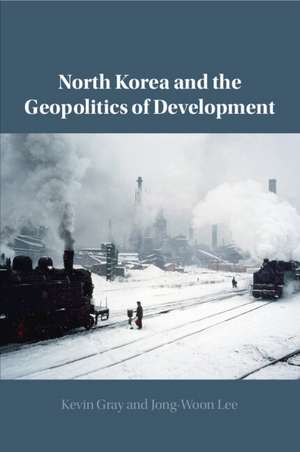North Korea and the Geopolitics of Development
Autor Kevin Gray, Jong-Woon Leeen Limba Engleză Paperback – 14 dec 2022
| Toate formatele și edițiile | Preț | Express |
|---|---|---|
| Paperback (1) | 205.41 lei 6-8 săpt. | |
| Cambridge University Press – 14 dec 2022 | 205.41 lei 6-8 săpt. | |
| Hardback (1) | 657.20 lei 6-8 săpt. | |
| Cambridge University Press – 14 apr 2021 | 657.20 lei 6-8 săpt. |
Preț: 205.41 lei
Nou
Puncte Express: 308
Preț estimativ în valută:
39.30€ • 42.83$ • 33.12£
39.30€ • 42.83$ • 33.12£
Carte tipărită la comandă
Livrare economică 23 aprilie-07 mai
Preluare comenzi: 021 569.72.76
Specificații
ISBN-13: 9781108826396
ISBN-10: 1108826393
Pagini: 302
Dimensiuni: 152 x 229 x 16 mm
Greutate: 0.41 kg
Editura: Cambridge University Press
Colecția Cambridge University Press
Locul publicării:Cambridge, United Kingdom
ISBN-10: 1108826393
Pagini: 302
Dimensiuni: 152 x 229 x 16 mm
Greutate: 0.41 kg
Editura: Cambridge University Press
Colecția Cambridge University Press
Locul publicării:Cambridge, United Kingdom
Cuprins
Preface; Introduction: The Development-Geopolitics Nexus in North Korea; 1. State Building and Late Development in North Korea; 2. Post-War Reconstruction and Catch-Up Industrialisation; 3. Geopolitical Contestation and the Challenge to North Korean Development; 4. Economic Decline and the Crisis of the 1990s; 5. Marketisation and the Transformation of the North Korean State; 6.North Korean Economic Reform in the Shadow of China; 7. Dependency in Chinese-North Korean Relations?; 8. International Sanctions and North Korean Development; Conclusion.
Recenzii
'In a major and highly original contribution to our understanding of North Korea, Kevin Gray and Jong-Woon Lee demonstrate that its development has been profoundly influenced by its challenging geopolitical context. Essential reading for anyone interested in this enigmatic nation.' Mark Beeson, author of Rethinking Global Governance
'Economic development has long been an aspiration for North Korea, even as it is left far behind its neighbors. Despite the catastrophic famine, food-shortage, and economic sanctions, North Korea continues its search for a model of economic development that squares the circle: a market economy without a significant market. This book puts North Korea's difficult quest for power and plenty in historical context, and is a welcome addition to the field.' Meredith Woo, author of Race to the Swift: State and Finance in Korean Industrialization
'[…] a compelling and interesting new narrative rich with detail that will be of interest to people who want to better understand North Korea's economic history.' Peter Ward, NK News
'This book will be very useful for students, journalists, and others who need a detailed yet concise summary of what is known about North Korea's economic development. It is well suited as the main textbook for an introductory course on that subject. Long-term experts with a more focused interest in North Korea will appreciate the book's value as a reference work.' Rüdiger Frank, Pacific Affairs
'This thought-provoking and deeply researched volume is a valuable addition to the field.' Jihyun Kim, Journal of Contemporary Asia
'Economic development has long been an aspiration for North Korea, even as it is left far behind its neighbors. Despite the catastrophic famine, food-shortage, and economic sanctions, North Korea continues its search for a model of economic development that squares the circle: a market economy without a significant market. This book puts North Korea's difficult quest for power and plenty in historical context, and is a welcome addition to the field.' Meredith Woo, author of Race to the Swift: State and Finance in Korean Industrialization
'[…] a compelling and interesting new narrative rich with detail that will be of interest to people who want to better understand North Korea's economic history.' Peter Ward, NK News
'This book will be very useful for students, journalists, and others who need a detailed yet concise summary of what is known about North Korea's economic development. It is well suited as the main textbook for an introductory course on that subject. Long-term experts with a more focused interest in North Korea will appreciate the book's value as a reference work.' Rüdiger Frank, Pacific Affairs
'This thought-provoking and deeply researched volume is a valuable addition to the field.' Jihyun Kim, Journal of Contemporary Asia
Notă biografică
Descriere
Examines how the emergence of North Korea's political economy was fundamentally shaped by broader processes of geopolitical contestation.
